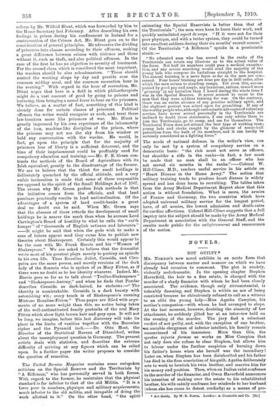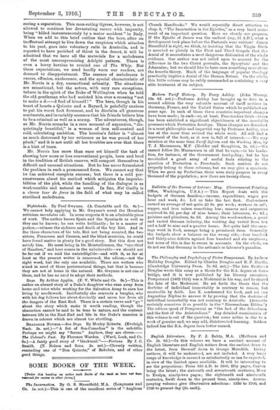NOVELS.
NOT GUILTY.*
Mn. NORRIS'S new novel exhibits in an acute form that discrepancy between matter and manner on which we have already had occasion to comment. The plot is crudely, violently melodramatic. In the opening chapter Stephen Haverfield, the heir to a fine estate, is charged with the murder of a shady financier with whom he had been closely associated. The evidence, though only circumstantial, is tolerably damning, and Stephen is within an ace of being convicted because he chivalrously refused to call as a witness to an alibi the young lady—Miss Agatha Campion, his mother's companion—with whom he had arranged to elope. At the last moment, however, doubting the sincerity of her attachment, he suddenly jilted her at an interview held on the evening of the . murder. The jury find a reluctant verdict of not guilty, and, with the exception of one brother, Ian amiable clergyman of inferior intellect, his family remain unconvinced of his innocence. More than this, the spretae injuria formcte so works on Miss Campion that not only does she refuse to clear Stephen, but allows him to labour under the further suspicion of burning down his father's house when she herself was the incendiary ! Later on, when Stephen has been disinherited and his father has died in the firm conviction of his guilt. Agatha deliberately sets to work to bewitch his twin brother, and marries him for his money and position. Then, when an Italian valet confesses to the murder of the financier, and Owen Haverfield announces his intention of making over the estate to his rehabilitated brother, his wife calmly confesses her misdeeds to her husband (whom. she has come .to .detest. cordially) as a means .of pro- it quilty. By Nit. E. toitilon: A. bonitable sail Co. [68.1 curing a separation. This man-eating tigress, however, is not allowed to continue her devastating career with impunity, being "killed instantaneously by a motor accident " in Italy. When we add to this brief outline that the hero, after an ineffectual attempt to live down the suspicion which attaches to his past, goes into voluntary exile in Australia, and is reported to have perished of thirst in the desert, it will be admitted that we have all the materials for a melodrama of the most uncompromising Adelphi pattern. There is even a horsy heroine to remind one of The Whip. But these expectations, we need hardly warn our readers, are doomed to disappointment. The essence of melodrama is excess, effusion, exuberance, and the special characteristic of Mr. Norris is a dry, unemotional urbanity. The situations are sensational, but the actors, with very rare exceptions, behave in the spirit of the Duke of Wellington when he told the old gentleman who had assisted him over a crossing "not to make a d—d fool of himself !" The hero, though in his heart of hearts a Quixote and a Bayard, is painfully anxious to put his worst foot foremost, and to disclaim all generous sentiments, and invariably assumes that his friends believe him to be a criminal as well as a scamp. The adventuress, though, as Mr. Norris remarks in a rare moment of expansion, "dis- quietingly beautiful," is a woman of iron self-control and cold, calculating ambition. The heroine's father is "almost as much distressed by her reticence as he was proud of her pluck," and it is not until all her troubles are over that there is a hint of tears.
Mr. Norris has more than once set himself the task of showing how more or less conventional people, born and bred in the tradition of British reserve, will comport themselves in difficult and unusual situations. But he has never formulated the problem in such a pronounced form. We cannot say that he has achieved complete success ; but there is a cold per- suasiveness about his method which mitigates the improba- bilities of the plot., while the handling of the dialogue is as workmanlike and natural as usual. In fine, Not Guilty is a clever tour de force in the field of what may be called sterilised melodrama.











































 Previous page
Previous page